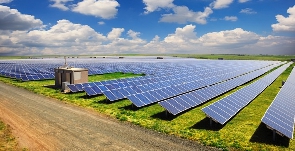The Institute for Energy Security (IES), an energy policy think tank, has said that generating electricity from wind and solar is more economical than nuclear, repeating its advice to the government to halt Ghana’s push for nuclear power generation.
“The potential savings attained by generating a set quantity of electricity from renewables as a substitute for nuclear power are revealed as close to 288 percent for wind and utility-scale solar photovoltaic (PV).
“Even without accounting for current subsidies, the cost of renewable energy has been shown to be considerably lower than the marginal cost of conventional energy technologies such as coal and nuclear,” the institute said in its latest analysis.
The analysis did not even take into account potential social and environmental externalities or reliability-related considerations with the alternative energy options.
The IES said its trend analysis based on Lazard’s Levelized Cost of Energy (LCOE) between 2010 and 2019 show that new unsubsidised wind and solar power were cheaper than some already running resources like coal, nuclear, and some gas.
It said the cost decline is rendering solar PV and wind increasingly attractive resources relative to conventional generation technologies with similar generation profiles.
“The modelling shows that solar power on its own can beat Gas Peaker plants on their own, without storage in any market,” the energy think tank said.
It said while capital costs for a number of “alternative energy” generation technologies are currently in excess of some conventional generation technologies, declining costs for many alternative energy generation technologies, coupled with uncertain long-term fuel costs for conventional generation technologies, are working to close formerly wide gaps in LCOE values.
“Lazard’s unsubsidised LCOE analysis has shown significant historical cost declines for utility-scale ‘alternative energy’ generation technologies, driven by, among other factors, decreasing supply chain costs, improving technologies and increased competition,” the institute said.
The IES insisted that it does not support the government’s move to switch the country’s energy base-load from Akosombo and Kpong hydropower to nuclear.
It said the government is seeking to introduce nuclear into the country’s energy mix at a time when many countries around the world, including Germany, Spain, Portugal, Belgium, Greece, and Italy, have either shut down or are in the process of pulling the plugs off nuclear plants because of complicated relationships with nuclear power.
“The institute sees the push for nuclear power as backward, given that times have changed to favour solar and wind energies, instead of nuclear power, based on economics, safety and security risks, and investment hurdles,” IES said.
Business News of Tuesday, 2 February 2021
Source: thebusiness24online.net
Wind, solar power cheaper than nuclear - IES
Entertainment












